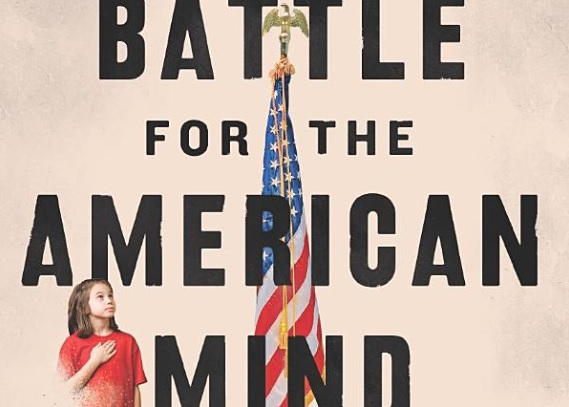
–>
July 8, 2022
With the publication of Battle for the American Mind, Pete Hegseth and David Goodwin have opened a Pandora’s box of troubles for parents and educators nationwide. In the first chapter, titled “OUR COVID-(16) 19 MOMENT,” Hegseth writes, “As a result of the virtual classrooms our children were forced into in 2020 and 2021 thanks to COVID-19, you likely have a growing sense: American education is off the rails.”
‘); googletag.cmd.push(function () { googletag.display(‘div-gpt-ad-1609268089992-0’); }); }
Specifically, Hegseth avers, “concepts like white privilege and systemic racism and even a new founding date for America, the year 1619, were splashed across computer screens all over America. Critical race theory had fully arrived (often masked as ‘Diversity, Equity, and Inclusion’), along with a full-on attempt to redefine gender, infuse climate fatalism, and turn our children into activists” (p.5).
That’s a lot of confusing concepts to include in a single declarative sentence. But prolixity seems to be part of Hegseth’s frantic style of writing, consistent with his way of talking on TV. Like his fellow Fox broadcaster and widely publicized author, Brian Kilmeade, Hegseth is a practiced huckster of traditional American values. That’s not surprising, especially in these times of stark political divide.
Nevertheless, Google site reviews of Hegseth’s book are glowing with praise from some of the most prominent media personalities. Kayleigh McEnany writes, for example, “Pete Hegseth brilliantly spotlights one of the most important issues facing our country: America’s children and their education. By exposing the undercurrents of wayward indoctrination in American education and reorienting the reader toward classical Christian education, he provides a solution to the feeling of hopelessness so many parents experience. Pete unrolls a road map to saving America’s children and providing our little ones a path to prosperity, success, and well-being.”
‘); googletag.cmd.push(function () { googletag.display(‘div-gpt-ad-1609270365559-0’); }); }
Victor Davis Hanson ― every conservative’s favorite scholar in the news media ― penetratingly observes, “Pete Hegseth, along with David Goodwin, argues that a return to classical education alone cannot save American students from a century of ideological pollution and dumbing down of both K–12 and higher education. Instead, they envision ‘Christian paideia’ reuniting Jerusalem with Athens and Rome, thereby restoring rational, empirical training that enhances faith and spirituality. Battle for the American Mind is cogent, occasionally polemical, and always engaging. Let us hope its passionate case for restoring morality and sanity helps to spark an American educational renaissance.”
But there is a dark side to Hegseth’s whiz-bang verbosity. If you move too fast in citing and tagging current events, you’re likely to miss important details. Hegseth himself recognizes this when he notes that even in his 2020 book (American Crusade: Our Fight to Stay Free), “my chapter on racism included not a single mention of critical race theory or the now-ubiquitous terms anti-racism or equity. The Left moves faster than we can type!” (p.7).
There’s yet another problem with this type of high-speed journalism. Miss too many important details in your haste, and you will quickly lose your audience. This is especially true when you are relying on the viewpoints of Baby-Boomer conservatives, who are likely to be more skeptical than those in the X, Millennial, and Z generations. In fact, it is these three generations who are most influenced by social media.
As a 2018 Pew Research report notes, “YouTube, Instagram and Snapchat are the most popular online platforms among teens. Fully 95% of teens have access to a smartphone, and 45% say they are online ‘almost constantly.'” Hegseth is the father of seven children, so he surely realizes that his own “kids” are part of the X, Millennial, and Z generation matrix. These young people will grow up to be the majority voice in America.
Big Tech companies like Facebook, Twitter, and You Tube use sophisticated algorithms not only to collect data about their users, but also to create news, so it’s likely these companies will not be just pipes for global propaganda, but also have an enormous influence on the political and social views of their users. As Jeffrey Herbst observed in the August 13, 2016 Wall Street Journal, “[a]n informed citizenry depends on robust sources of news. How technology firms position themselves as news providers, and the choices they make as a result, will have an effect not only on the companies themselves but also on the quality of our democracy.”
Hegseth does draw attention to this potential threat when he describes the books he has found for children in stores like Barnes & Noble. “The last time I visited mine, of the forty children’s books displayed, at least thirty were progressive, agenda-driven books. … For young people, it’s no better on Television and social media. … I still won’t allow my kids on social media. But I know it’s coming” (p. 11). He also notes a few pages later that “[m]ultiple polls in the past few years ― from Gallup to Pew to Axios ― have shown that for younger Americans, socialism is viewed roughly as favorably, and in some cases more favorably, than capitalism” (p. 34). Perhaps this had something to do with the impact of YouTube, Instagram, and Snapchat on these youngsters.
‘); googletag.cmd.push(function () { googletag.display(‘div-gpt-ad-1609268078422-0’); }); } if (publir_show_ads) { document.write(“
It’s pretty clear Hegseth is in a big hurry to promote a much bigger message. For, as he says in Chapter 11, under the sub-heading INACTION IS NOT AN OPTION, “[w]e are pinned down, caught in an enemy near ambush. The enemy has the high ground and is shooting. We are on the ‘X’ in the kill zone. Our families, our kids, our country, and our faith are in the crosshairs. We can talk strategy all we want, but our reality right now is tactical. Hand-to-hand combat, face-to-face” (p. 238).
This scary warning is the lead-in to Hegseth’s final chapter, titled “AN EXHORTATION FOR PARENTS.” Here, he demands that parents must “join a movement ― an insurgency ― that contributes to something that outlasts your life. In an upside-down world, classical Christian education is the only comprehensive educational model that can restore our Western Christian Paideia [WCP], and give our kids and grandkids a fighting chance to save America and Christendom” (p. 251).
But there’s a huge caveat that Hegseth noted earlier in Chapter 11: money talks. “Without serious outside financial support, such as millionaires and billionaires putting their money from the Ivy League and pouring it into classical Christian education [CCE], our insurgency will fail” (p. 231). Given our current leadership in the nation’s capital, which will continue to wreck our economy at least until 2024, there’s little chance America will be able to afford to save itself.
Then too, there’s the looming threat of Biden’s open border policy, which is something Hegseth never mentions. So it seems we are now all stuck in “The Kill Zone.”

<!– if(page_width_onload <= 479) { document.write("
“); googletag.cmd.push(function() { googletag.display(‘div-gpt-ad-1345489840937-4’); }); } –> If you experience technical problems, please write to [email protected]
FOLLOW US ON
<!–
–>
<!– _qoptions={ qacct:”p-9bKF-NgTuSFM6″ }; ![]() –> <!—-> <!– var addthis_share = { email_template: “new_template” } –>
–> <!—-> <!– var addthis_share = { email_template: “new_template” } –>






